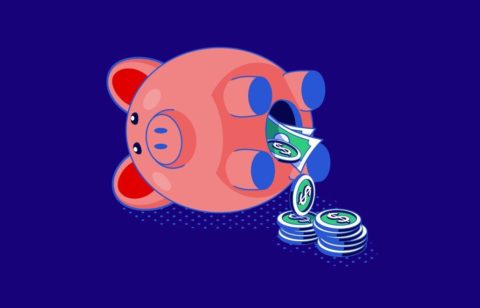Like any other financial decision, debt consolidation has its pluses and minuses. If you are heavily in debt, especially to multiple creditors, debt consolidation can be a viable solution and a lifesaver. You may need a minimum credit score to qualify for debt consolidation.
This type of loan is used to pay off your current credit cards and other debts. After that, your new loan will have a single balance that requires just one monthly payment. No more juggling multiple payments with various due dates. You should start paying a lower interest rate than the average of your current debts for it to be your optimal choice.
Before you decide that debt consolidation is the best option for you, it is important to consider both sides of the coin.
The Pros
Debt consolidation has plenty of upsides. In fact, thousands of people across the country have used this method to get a handle on their debts. The most significant pros include reduced short and long-term payments, lower interest charges, a reduced monthly payment, and the ability to set a deadline for paying off your debt.
Single payments ease your mind
One of the most difficult aspects of owing debt to multiple creditors isn’t just having to pay back all that money. Another obstacle is keeping track of all the different payments you owe with different amounts, interest charges and due dates. As these payments begin to add up, they can become more than just a drain on your wallet. All that varied debt could make your head spin!
If you do lose track of one or more of your bills, you can count on paying late fees and possibly other penalties. If the debt remains outstanding for too long, you might start to receive those dreaded calls and threatening letters from collection agencies. The point of these communications is to scare you into taking drastic measures to pay back your debts. If you don’t have the means to take immediate action, you might begin to feel a deep sense of dread every time your phone rings.
Missing payments can also harm your credit score. And building it back up isn’t easy and takes time. Your credit score plays an important role in your creditworthiness. Lenders use your score to determine if you are a good candidate to pay back the loan. If you have a low credit score, the lender will consider you a bad credit risk and not offer you credit. If they do, it will be at a high-interest rate to protect their investment in you.
With only one payment to worry about, you are much less likely to lose track of deadlines and incur late fees. This helps keep the collection agencies away and protects your credit score.
Save money
In addition to making your debt easier to manage, another goal of debt consolidation is to save money on the debt owed, starting with a lower interest rate.
Most debt consolidation loans come at a fixed interest rate. So, you pay the same amount every month until the loan is paid off. Let’s say you have four credit cards from four different banks ‑ all at different interest rates. You could use a debt consolidation loan to pay off those cards and have just one loan to manage instead of four. Simple, right? Just be sure the new loan offers a lower interest rate than the average of your current credit card lenders.
Here’s a breakdown of debt consolidation’s main benefits:
- Simplify your monthly payments – Making one monthly payment lessens your chances of missing payments and incurring late fees.
- Lower payments – Debt consolidation can help you save money to build a financial safety net and prevent you from falling back into debt.
- Save on interest costs – You can receive a lower interest rate that will help pay off your credit card debts faster and for less money.
- Getting caught up – A debt consolidation loan can help you catch up on bills if you are running behind.
- Repay on a fixed schedule – Many debt consolidation loans have a timeline. If you adhere to the payment schedule, your end date is always within sight.
National Debt Relief offers debt consolidation loans as part of its debt relief program:
- Up to 50% lower monthly payments
- Reduce multiple payments down to one
- Debt-free in as little as 24-48 months
- Quick 2-minute approval
The Cons
Debt consolidation has its fair share of cons, including the fact that it can be difficult to get if you have bad credit. In addition, it is a temporary solution to a long-term spending issue.
It is important to consider every cost when determining if a debt consolidation loan will save you money. Depending on the lender, you could pay hundreds if not thousands in late and early repayment fees. While including these fees may still cost less than your current debt, it is important they are considered.
Some debt consolidation loans come with fees, including:
- Loan origination fees
- Balance transfer fees
- Closing costs
- Annual fees
If you miss a monthly loan payment, you will likely be charged a late fee. In addition, if a payment is returned due to insufficient funds, some lenders will charge a returned payment fee. These fees can greatly increase your borrowing costs.
Since lenders typically report a late payment to the credit bureaus after it becomes 30 days past due, your credit score can suffer. This can make it harder for you to qualify for future loans and get a lower interest rate.
There are a few types of debt consolidation loans:
Debt consolidation loan
Debt consolidation loans present an option for debt that is spread across multiple lenders like credit cards. It cuts your loans down to one at a lower interest rate and more affordable monthly payment. You use that loan to pay off your debts at once then focus on paying back the single loan. It is important to avoid increasing your credit card debt once you get a debt consolidation line because you could end up worse off than when you started.
Credit card transfer
For new credit cards with no-to-low interest rates, a balance transfer can help you pay off your debt. Just make sure you can pay it off before the interest rate skyrockets after the introductory period expires. You can also transfer your debt to an existing credit card if they are running a promotion with a fixed rate or low-interest rate.
Some creditors may offer a hardship program where you pay a monthly agreed-upon amount over a longer period. In addition to making your payments more manageable, you can save money by avoiding extra interest. You need to reach out directly to your creditors to discuss this option.
For example, if you owed $7000 on a credit card you could offer the issuer a lump sum payment of $3500 to settle the debt. If you can prove that you’re suffering from serious financial hardship, the credit card company might agree to settle for that amount.
You’ll need to have documentation to prove you have a serious financial hardship including:
- A list of all your debts
- The amount you owe on each debt
- The last time you were able to make a payment on your bills
- Any minimum payments
HELOCs
If you own a home, a HELOC may be a good option. A HELOC is a home equity loan or a home equity line of credit. The amount is based on your home value, and it serves as a second mortgage or open line of credit. Some HELOCs switch from a fixed rate to a variable rate after the first six months. But the interest rate is usually less than what a credit card company would charge.
If you have a decent credit score and don’t like tracking every expense and bill payment, you might want to consider debt consolidation. By paying a lower monthly payment and interest rate, you will enjoy a bit of breathing room with your finances.








